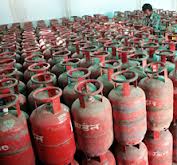
New Delhi, December 7: Shoddy implementation of the government's new quota system for subsidized cooking gas has resulted in chaos. There's utter confusion about how many subsidized cylinders a consumer is entitled to in the remaining six months of 2012-13 since the new scheme was announced on September 13, 2012.
That day's government release was unambiguous. It said: "The number of subsidized LPG cylinders available to each consumer in the remaining part of the current financial year will be three."
But some dealers believe that consumers have already run out of their quota, while some others insist that unless consumers fill up the KYC form, cylinders can't be given to them.
Similarly, there's confusion over what it takes to fill up the KYC ( know-your-customer) form. Ask Ananya Gupta of Mumbai's Matunga. She was suddenly asked to produce her marriage certificate, PAN card, bank account details and the original registration book by her dealer for her KYC form or face discontinuation of gas supply.
Original registration book? Is that the blue book that most consumers have misplaced? Questions such as these are redundant because the KYC form makes no such demand. It requires two things: ID proof and address proof. And for this driving licence, passport, ration card, phone or electricity bill, Adhaar card and several other ordinary things will suffice.
But dealers don't know or pretend not to know. P N Seth, vice-president of All-India LPG Dealers' Association, for instance, doesn't know about the three-cylinder quota in the six remaining months of the year since September. He said, "Most consumers have completed their quota and are now buying non-subsidized gas."
All-India Indane Distributors' Association president A Ramachandran said consumers were "not cooperating".
He said, "If they don't submit the KYC form by year end (the new deadline), the connections would be blocked."
An Indane dealer in Anna Salai helpfully added: "Once a connection is blocked, it can only be unlocked after government permission."
In this confusion over gas supplies, a black market in cylinders is flourishing. Some consumers said they were buying cylinders well above the non-subsidized price range of Rs 885-950 band (depending on VAT) per cylinder.
A consumer in Delhi's Alaknanda area, Mitashi Saxena, was unsure about whether she was required to fill a KYC form or not, and wondered whether she would get subsidized cylinders next year.
"We're a family of eight and have two kitchens. But we still don't know whether we need to fill the form. And our distributor doesn't seem to know either,'' she said. Another resident complains of delayed service.
For people in hill states like J&K, Himachal Pradesh and Uttarakhand, where families need more fuel to keep warm, it's going to be a winter of discontent. "We've not been contacted by our dealer and run out of out quota. We're planning to spend some time with relatives in the plains," said Shivani Joshi of Nainital.
In Chandigarh, too, large families that don't have separate kitchens on different floors, have been jolted by the new condition. Federation of Chandigarh sector welfare association chairman P C Sanghi said the decision is against Indian tradition of large joint families. Consumer rights activist Arvind Thakur said, "A bigger issue is that building byelaws are so stringent in Chandigarh that people can't even think of building a separate kitchen."
Lucknow housewife Rita Singh spent several tense days when the cylinder did not fetch up even eight days after booking — as against the normal period of 48 hours.
"When I asked, they said most of their staff was engaged in KYC verification," she said.






Comments
Add new comment